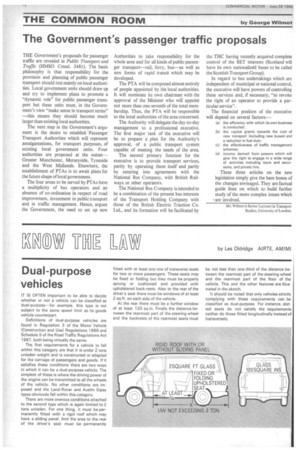The Government's passenger traffic proposals
Page 74

If you've noticed an error in this article please click here to report it so we can fix it.
THE Government's proposals for passenger traffic are revealed in Public Transport and Traffic (HMSO Cmnd. 3481). The basic philosophy is that responsibility for the provision and planning of public passenger transport should rest mainly on local authorities. Local government units should draw up and try to implement plans to promote a "dynamic role" for public passenger transport but these units must, in the Government's view "make sense in transport terms" —this means they should become much larger than existing local authorities.
The next step in the Government's argument is the desire to establish Passenger Transport Authorities which will represent amalgamations, for transport purposes, of existing local government units. Four authorities are proposed at the outset— Greater Manchester, Merseyside, Tyneside and the West Midlands. Elsewhere, the establishment of PTAs is to await plans for the future shape of local government.
The four areas to be served by PTAs have a multiplicity of bus operators and an absence of co-ordination in respect of road improvement, investment in public transport and in traffic management. Hence, argues the Government, the need to set up new Authorities to take responsibility for the whole area and for all kinds of public passenger transport—rail, ferry, bus—as well as new forms of rapid transit which may be developed.
The PTA will be composed almost entirely of people appointed by the local authorities. It will nominate its own chairman with the approval of the Minister who will appoint not more than one-seventh of the total membership. Thus, the PTA will be responsible to the local authorities of the area concerned.
The Authority will delegate the day-to-day management to a professional executive. The first major task of the executive will be to prepare a plan for the Authority's approval, of a public transport system capable of meeting the needs of the area.
The second primary function for the executive is to provide transport services, partly by operating them itself and partly by entering into agreements with the National Bus Company, with British Railways or other operators.
The National Bus Company is intended to be a combination of the present bus interests of the Transport Holding Company with those of the British Electric Traction Co. Ltd., and its formation will be facilitated by the THC having recently acquired complete control of the BET interests (Scotland will have its own nationalized buses to be called the Scottish Transport Group).
In regard to bus undertakings which arc independent of municipal or national control, the executive will have powers of controlling these services and, if necessary, "to revoke the right of an operator to provide a particular service".
The financial position of the executive will depend on several factors:
(a) the efficiency with which its own business is conducted; (b) the capital grants towards the cost of new transport (including new buses) and a reduction in fuel duty; (c) the effectiveness of traffic management schemes: Id/ income derived from powers which will give the right to engage in a wide range of activities including tours and excursions, and private hire.
These three articles on the new legislation simply give the bare bones of the changes envisaged. They are factual guide lines on which to build further study of the more complex issues wliich are involved.
Mr. Wilmot is Senior Lecturer in Transport Studies, University of London.
























































































































